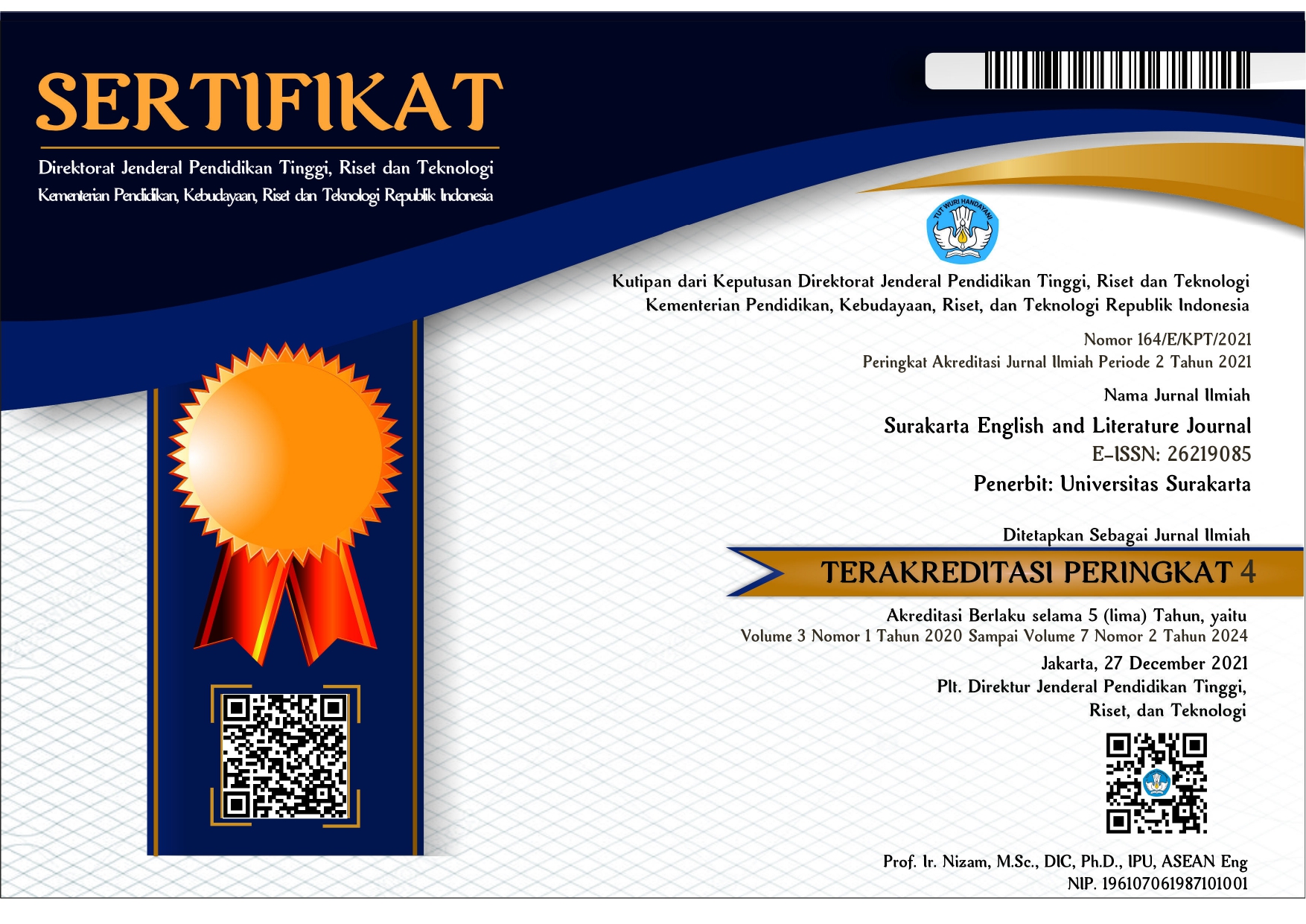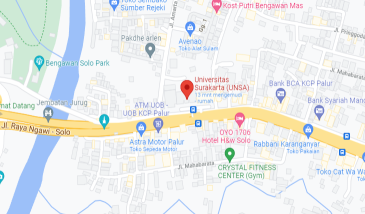The Use of Flashcard in Teaching English Vocabularies by Young Mothers
Keywords:
Flashcards, English, VocabulariesAbstract
This study aims to determine how to apply flashcards in teaching English vocabulary by young mothers in the Dawis PKK Desa Dua Belasan RT I RW III Jombor Kec. Bendosari Kab Sukoharjo. The problems in this study were examined by qualitative descriptive research because the results of the approach were explained by using words. This research was conducted in the village of Dua belasan Jombor Sukoharjo. Meanwhile, data collection techniques are observation and documentation. The use of flashcards to teach English can be done in three ways. Flashcards in the standard way, namely quickly changing flashcards in front of the children, then flashcards were combined with songs and lastly flashcards were combined with hide and seek games. There are two advantages of a flashcard, it is like a game and it can be combined by singing a song. Apart from that, there are two weaknesses of using the flashcard. Teachers must be creative and must find ways to integrate other media on an ongoing basis. Then, Children did not feel bored in learning English using flashcards.
References
Adimayanti, E., & Siyamti, D. (2020). TERAPI BERMAIN ENGLISH GAMES UNTUK MENINGKATKAN KEMAMPUAN KOGNITIF ANAK PRASEKOLAH. Jurnal Pengabdian Kesehatan. https://doi.org/10.31596/jpk.v3i2.84
Ardiyanti, A., Bandu, I., & Usman, M. (2018). PEMBELAJARAN KOSAKATA BAHASA PRANCIS DENGAN MEDIA FLASHCARD (STUDI KASUS PADA MAHASISWA SASTRA PRANCIS). JURNAL ILMU BUDAYA. https://doi.org/10.34050/jib.v6i1.4327
Bowen, G. A. (2009). Document analysis as a qualitative research method. Qualitative Research Journal. https://doi.org/10.3316/QRJ0902027
Davidavičienė, V. (2018). Research Methodology: An Introduction. https://doi.org/10.1007/978-3-319-74173-4_1
Flick, U. (2012). Designing Qualitative Research. In Designing Qualitative Research. https://doi.org/10.4135/9781849208826
Fridani, Lara; Dhieni, N. (2014). Hakikat Perkembangan Bahasa Anak. Metode Pengembangan Bahasa.
Hidayat, N., Sukmaningrum, R., Musarokah, S., & Hawa, F. (2012). MEDIA GLENN DOMAN SEBAGAI PENGAJARAN MEMBACA DAN MEMPERKAYA ENGLISH VOCABULARY ANAK SECARA MANDIRI DI RUMAH. E-DIMAS. https://doi.org/10.26877/e-dimas.v3i1.253
Khan, S. N. (2014). Qualitative Research Method: Grounded Theory. International Journal of Business and Management. https://doi.org/10.5539/ijbm.v9n11p224
Miles, M. B., & Hubberman, A. M. (2014). Qualitative data analisys. In CEUR Workshop Proceedings.
Musyahidah, U., Sriwahyuni, S., & Darwis, D. (2019). HUBUNGAN ANTARA BERMAIN MENGENAL WARNA DENGAN PERKEMBANGAN KOGNITIF ANAK DI TK FRATER BAKTI LUHUR MAKASSAR. Jurnal Ilmiah Kesehatan Diagnosis. https://doi.org/10.35892/jikd.v14i3.251
National Reading Panel. (2000). Teaching children to read: An evidence-based assessment of the scientific research literature on reading and its implications for reading instruction. NIH Publication No. 00-4769.
Papert, S. (1972). Teaching Children Thinking. Programmed Learning and Educational Technology. https://doi.org/10.1080/1355800720090503
Rahman, B., & Haryanto, H. (2014). PENINGKATAN KETERAMPILAN MEMBACA PERMULAAN MELALUI MEDIA FLASHCARD PADA SISWA KELAS I SDN BAJAYAU TENGAH 2. Jurnal Prima Edukasia. https://doi.org/10.21831/jpe.v2i2.2650
Rini, H. L. S., Dewi. S, A. C., & Munawar, M. M. (2019). PENGARUH METODE GLENN DOMAN TERHADAP KEMAMPUAN MEMBACA PERMULAAN PADAUSIA 5-6 TAHUN DI TK MARANATHA 01 SEMARANG. PAUDIA : JURNAL PENELITIAN DALAM BIDANG PENDIDIKAN ANAK USIA DINI. https://doi.org/10.26877/paudia.v7i2.3267
Sitompul, E. Y. (2013). Teaching Vocabulary Using Flashcard and Word List. Journal of English and Education.
Sutton, J., & Austin, Z. (2015). Qualitative Research Data Collection. Canadian Journal.
Downloads
Published
How to Cite
Issue
Section
License
Copyright (c) 2022 Nurnaningsih

This work is licensed under a Creative Commons Attribution-ShareAlike 4.0 International License.
Licensing for Data Publication
-
Open Data Commons Attribution License, http://www.opendatacommons.org/licenses/by/1.0/ (default)
-
Creative Commons CC-Zero Waiver, http://creativecommons.org/publicdomain/zero/1.0/
-
Open Data Commons Public Domain Dedication and Licence, http://www.opendatacommons.org/licenses/pddl/1-0/














